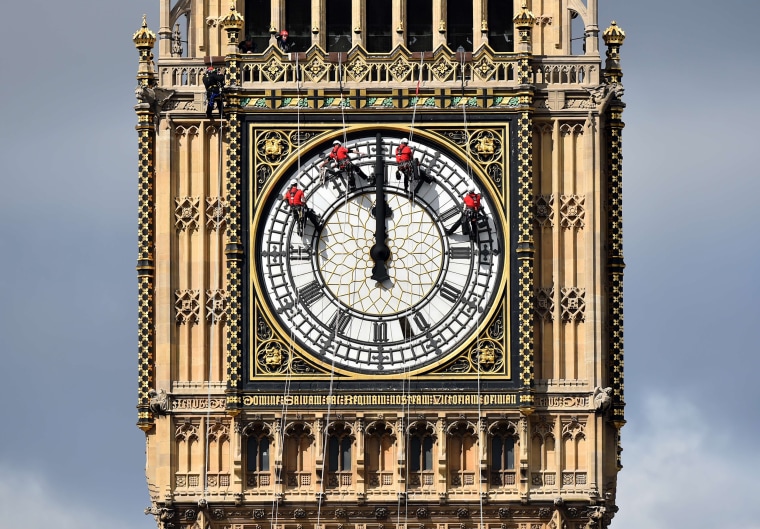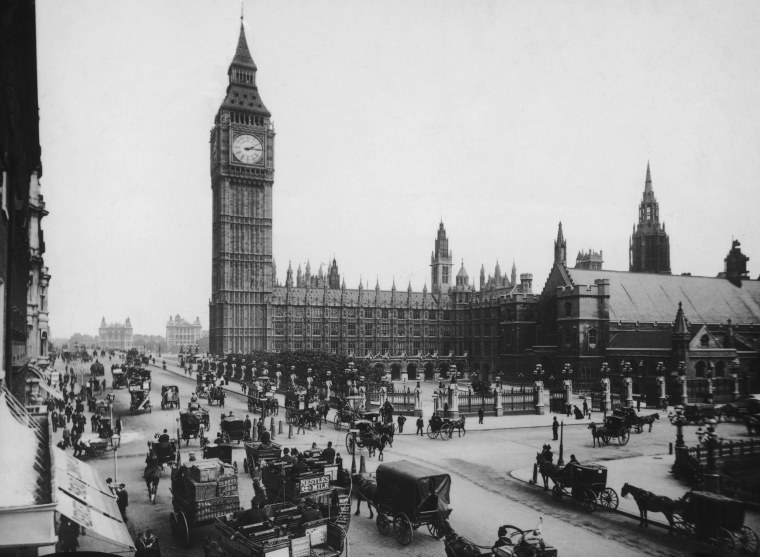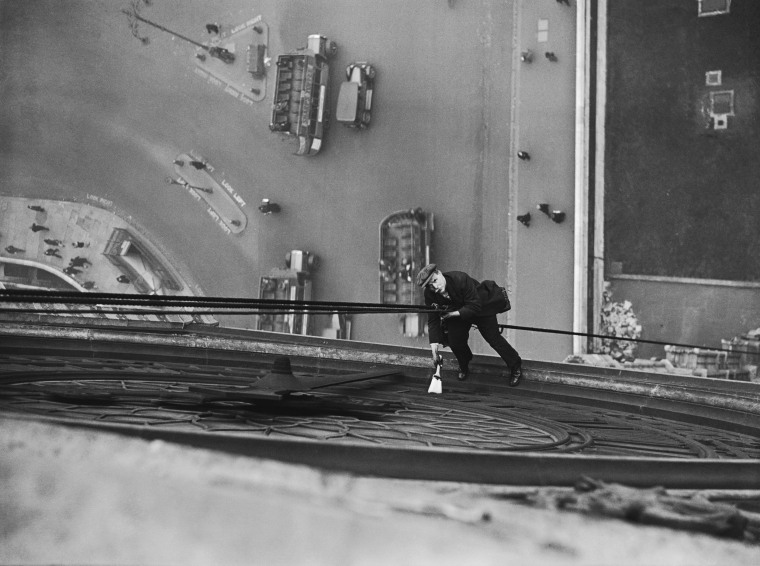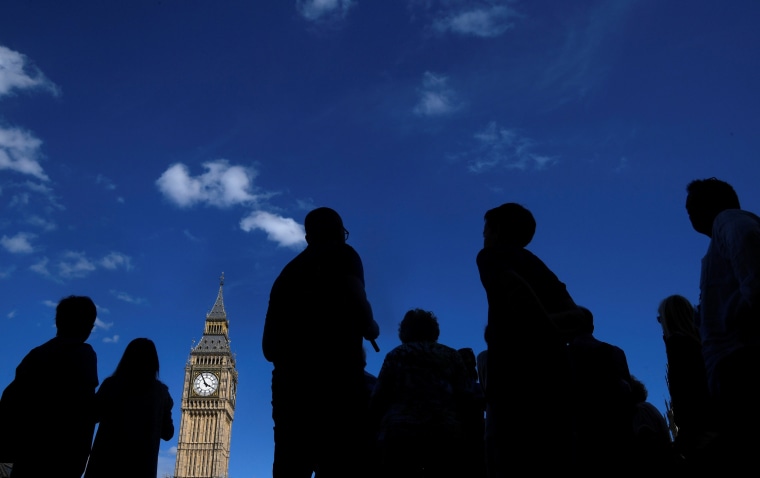LONDON — Who knew repairing a clock could provoke such outrage?
But this isn't just a case of winding up an antique timepiece gathering dust in the hall. This is the 315-foot tower commonly known as Big Ben, the iconic landmark synonymous with London's skyline.
Built 158 years ago, Big Ben has this week found itself at the center of a nationwide storm.
Politicians fumed and newspapers seethed after it came to light the Great Bell would fall silent on Monday, dinging its last dong until 2021 while construction workers carry out £29 million of repairs (around $37 million).

Big Ben is actually the nickname given to the bell rather than the tower itself, but over the years it has come to describe the entire structure that looms over the northern end of the Palace of Westminster, the home of the British Parliament.
Last renovated more than 30 years ago, the tower is now in dire need of extensive repair. Officials at Parliament say this can't happen while Big Ben is chiming because the noise would damage workers' hearing.
At 13.7-tons and 7 feet 2 inches, the deafening bell is twice the weight of an African elephant and about as tall as former basketball star Yao Ming. It's also incredibly loud.
"Silencing Big Ben is like stopping the heartbeat of our democracy"
"When … Big Ben bongs near you, you'll know it," said the Trades Union Congress, or TUC, which represents 5.6 million workers across the U.K. "At nearly 120 decibels, it's like putting your ear next to a police siren."
No sooner were the plans announced Monday, the more traditionalist elements of the British media began to vent their collective spleens.
"Not even Nazi bombs could silence the famous symbol of Britishness," raged the Daily Mail, a popular right-wing newspaper with a penchant for stirring headlines.
Before long, several prominent lawmakers got involved. David Davis, a cabinet minister in the ruling Conservative government, said the decision was "mad" and complained there was "hardly a health and safety argument" for silencing the bells.
Some of his fellow lawmakers claimed that, while they had approved the plans, they weren't told the details, and would have thought twice if they were.
On Wednesday, Prime Minister Theresa May got involved.
"Of course we want to ensure people's safety at work but it can't be right for Big Ben to be silent for four years," she said, urging officials to have a rethink. The House of Commons Commission said it will review the plans and see if the work can be done quicker.
All this may seem excessive fretting over the fate of a clock. And with other more substantive issues afoot — namely how a divided British government will negotiate Britain's impending exit from the European Union — many in the U.K. would agree. But for some Brits, it's hard to overstate the symbolism of Big Ben.
Millions hear its chimes everyday. The bongs welcome the start of news bulletins on the BBC — the U.K.'s national broadcaster that is a British institution in its own right. And they have rung out across London, almost without interruption, since this spectacle of neo-Gothic Victorian engineering was completed in 1859.
"Silencing Big Ben is like stopping the heartbeat of our democracy," said one mournful editorial in the Daily Telegraph, another right-wing newspaper.

It's not only Londoners who might get in a huff about the plans. Many of the 19 million tourists who visited the British capital last year likely paid their airfares hoping to see this world famous landmark, which is part of a UNESCO World Heritage Site.
After Monday, the sightseers might be disappointed; during the repairs as many as three of Big Ben's four clock faces will be covered by scaffolding at any one time.
There have been periods of silence before, notably during World War II and the funerals of former prime ministers Winston Churchill and Margaret Thatcher. And the current plan does allow for the occasional chime on special events like New Year's Eve and Remembrance Sunday.
It also isn't the first time the chimes have been paused for renovation. But in modern times the bell has never faced a silent spell anywhere near as long as this — nor a renovation more ambitious.
Workers will dismantle the Great Clock and reassemble it piece-by-piece; they will install a new lift; and they will remove, examine and replace each of the tower's roof slabs.
This means covering the tower in scaffolding so they can tackle what Parliament describes as "a wide range of the complex issues created by the height and heritage of this unique landmark."
The sheer volume of the bells — about as loud as putting your head next to a jackhammer — means none of this can be done without silencing Big Ben's bongs.
Stopping and starting the clock when the workers are on and off site isn't an option, either. On each occasion, this would involve locking the striking hammer, disconnecting the bells, and lowering the weights to the base of the tower, a "complex and lengthy process" that takes about a day and a half, according to Parliament.
The arcane construction of the mechanism means keeping it accurate is a struggle at the best of times. The clock keeps time to within one second — a rarity in the 1850s — but even the experts who maintain it today are still forced to balance pennies on its weights in order to keep Big Ben on time.
"We know August is silly season, but today’s headlines just don’t ring true," the TUC said Tuesday, referring to the furor surrounding the decision. "Protecting workers' hearing is far from 'health and safety gone mad,' it's just plain common sense."
This comment gets to the heart of the controversy surrounding Big Ben.
The phrase "health and safety gone mad" is often used by British conservatives who claim that years of needless government regulation has led to unnecessary rules that hinder efficiency and stifle business.
Although this is something experts have attempted to debunk this as a dangerous myth, it was that same spirit which partly drove last year's referendum to the leave the European Union, which is more commonly known as Brexit.

Elements of the British media have cast the EU as a foreign force intent on imposing unnecessary bureaucratic "red tape" on the U.K. David Davis, the Conservative cabinet minister who criticized the Big Ben renovation, is the U.K.'s government minister for Brexit.
Whatever the long-term plans, Parliament officials in charge of the renovation responded to the criticism by issuing a defiant statement Wednesday.
While they said they would look at reducing the projected downtime, they maintained that "the bells will cease to ring, as planned, following the chimes at noon on Monday 21 August."
It added: "Big Ben's bongs are an integral part of parliamentary life and we will ensure that they can resume their role as the nation’s timekeeper as soon as possible."

